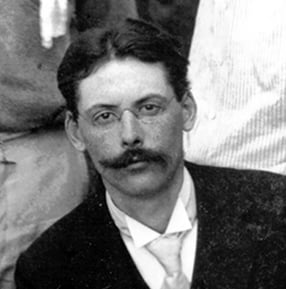Sonnet
Oh for a poet—for a beacon bright
To rift this changeless glimmer of dead gray;
To spirit back the Muses, long astray,
And flush Parnassus with a newer light;
To put these little sonnet-men to flight
Who fashion, in a shrewd mechanic way,
Songs without souls, that flicker for a day,
To vanish in irrevocable night,
What does it mean, this barren age of ours?
Here are the men, the women, and the flowers,
The seasons, and the sunset, as before.
What does it mean? Shall there not one arise
To wrench one banner from the western skies,
And mark it with his name forevermore?
This poem is in the public domain. Published in Poem-a-Day on July 6, 2024, by the Academy of American Poets.
“Sonnet” was first featured in Edwin Arlington Robinson’s second poetry collection, The Children of the Night (Richard G. Badger & Company, 1897). In Aspects of the Poetry of Edwin Arlington Robinson (The Dunster House Bookshop, 1928), Lucius Beebe reviews Robinson’s book, affirming: “There is true fire in his verse, and there are the swing and singing of wind and wave and the passion of human emotion in his lines; but his limitations are vital. His humor is of a grim sort, and the world is not beautiful to him, but a prison house. In the night there is weeping and sorrow, and joy does not come in the morning. But here and there in a sonnet he lets himself go, and the cry of a yearning spirit enters the lute of Orpheus and sounds a sweet and wondrous note. We quote one sonnet itself which is free and unrestrained and spontaneous in its outburst, flinging itself into form with a natural abandon and full blooded life: [...] Oh for a poet—for a beacon bright.”

